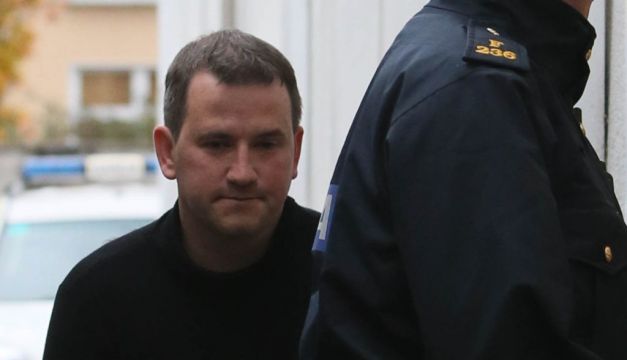Murderer Graham Dwyer had to be spoken to by his legal team on Friday after he repeatedly interrupted his appeal hearing and denied that he texted his victim Elaine O'Hara that he would "love to stab a girl to death sometime" and that "blood turns me on".
Dwyer (50), who murdered the vulnerable care worker for his sexual gratification in 2012, is appealing his conviction. His lawyers are arguing that the retention of mobile phone data used in the case is an "opportunistic form of mass surveillance" that transforms phones into tracking devices that can reveal a detailed picture of every aspect of a person's life.
At the Court of Appeal on Friday, Dwyer repeatedly interrupted Sean Guerin SC, for the DPP, to deny text messages attributed to him.
Text message
Mr Guerin was drawing the court's attention to a June 27th, 2011, text message which was sent from a phone attributed to Dwyer that read: "I want to stick my knife in flesh while sexually aroused. Blood turns me on and I would love to stab a girl to death sometime."
Blood turns me on and I would love to stab a girl to death sometime
Mr Guerin said Dwyer did to Ms O'Hara what he said he was going to do.
"I didn't say any of that," interrupted Dwyer from the prisoner's area.
Mr Guerin said that one text message from Dwyer to his victim read that if anyone was to ask her who was texting her, she should tell them it was her brother.
"I never wrote that," Dwyer again interrupted. On another occasion he interrupted Mr Guerin by simply saying "no" when counsel was speaking about text messages.
Interruptions
Court of Appeal President George Birmingham addressed Mr Farrell about his client's interruptions and said: "Mr Farrell, we have ignored one interruption...". Dwyer's legal team then spoke to him about his behaviour.
Mr Guerin said there was "overwhelming" evidence in the case that Dwyer was the user of the phone but that there had not been a dependence on using the disputed call data in securing the guilty verdict at trial.
"The appellant is over-stating, significantly, the use of the call data," said Mr Guerin, who said there was also the Garda process of investigating a suspect during an investigation to be considered.
Routes
The barrister said Dwyer was identified at trial through three different routes. "
One was call-data. At the same time, there is an old-fashioned detective job in Blackrock garda station which involved reading the text messages and identifying personal information which would point towards the identity of the suspect," he said.
He added that there was also scientific analysis regarding DNA and genetic materials that also produced the same suspect.
Mr Guerin said there were four elements to the DPP's case at the trial that had not changed.
"The first point was that he [Dwyer] was the author of the text messages and connected to Ms O'Hara. The second thing we sought to do was to show the desires expressed in the text messages were real and reflected the intention to kill. Thirdly, that the circumstances of Ms O'Hara disappearance and death could only be explained by the realisation of that intention. The fourth element was to eliminate any other possibility, in this case suicide, as an explanation," he said.
Mr Guerin said one text from Ms O'Hara to the phone attributed to Dwyer read: "You're now a daddy again." At the trial, the child's birth-certificate matched the date of the text, which the DPP said proved it was Dwyer who was using the phone.
Counsel said that on April 4th, 2011, the phone attributed to Dwyer texts saying he has a committee meeting at Shankill Flying Club and a witness gave evidence and produced minutes proving Dwyer's attendance.
On another date the phone attributed to Dwyer complains in a text of an almost €4,000 bill to fix his car, which documents produced in court corroborated.
Mobile phone data
Similar texts regarding buying a new bike, an email query to a tattoo parlour, entering a model plane flying competition, getting a wage reduction and a reception at the Polish embassy were also all corroborated by witnesses or documents at trial, said Mr Guerin.
Mr Guerin asked if there could there be "any other person in the world" with a child born on the same day Dwyer's child was born, who also bought a bike on the same day Dwyer did and whose car bill, pay cut, flying competition entry, and attendance at a reception at the Polish Embassy all matched the dates of the texts referencing them.

Remy Farrell SC, for Dwyer, has told the three-judge Court of Appeal that mobile phone data should not have been admitted as evidence in his client's trial as the retention of that data was a breach of his rights under the European Charter of Fundamental Rights. Mr Farrell said that the Court of Justice of the European Union (CJEU) has said "again and again" that the retention of mobile phone data cannot be done, and the Irish courts must now "internalise" what the European court has said.
Dwyer, a Cork-born architect with an address at Foxrock in Dublin, was convicted by a jury at the Central Criminal Court in 2015 of the murder of 36-year-old Elaine O'Hara on August 22nd, 2012. His victim had been discharged from a mental health hospital hours earlier.
Dwyer fantasised about stabbing a woman during sex and used Ms O'Hara to fulfil his fantasy. After murdering her he disposed of some of her belongings in the Vartry reservoir in Wicklow and tried to make it look like she had committed suicide. He dumped her body in a forest where it was found in 2013.
The appeal continues at the Central Criminal Court this afternoon before Mr Justice Birmingham, Ms Justice Isobel Kennedy and Mr Justice John Edwards.







